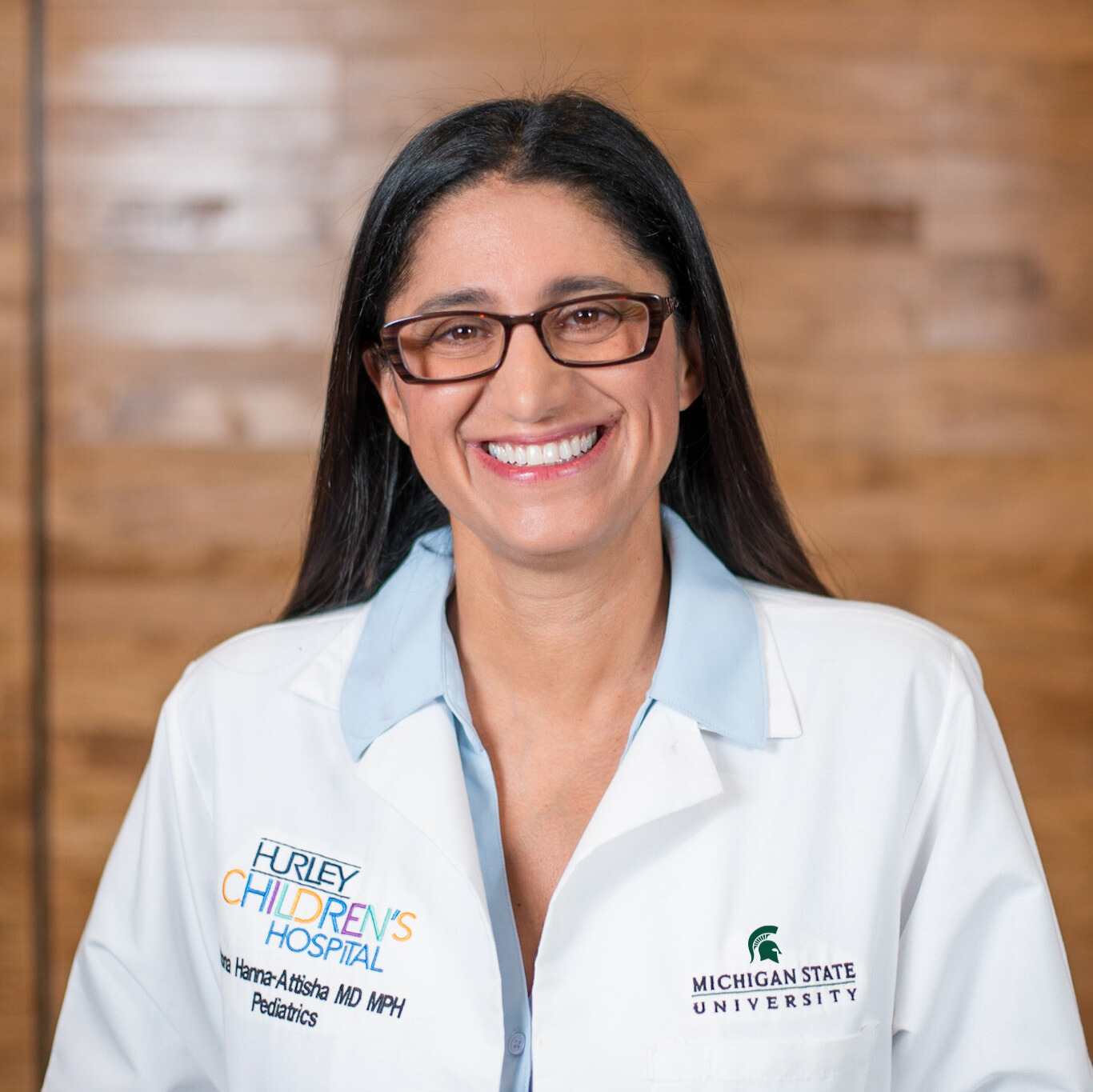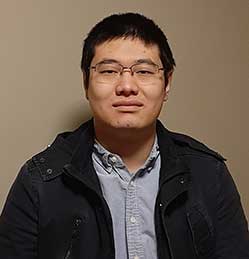Department Seminar SERIES
The Department sponsors a biweekly seminar series during the academic year on topics of epidemiologic and biostatistical interests. Speakers include Michigan State University faculty, Michigan Department of Community Health public health professionals or invited guests from around the nation or, occasionally, overseas.
The seminar is open to all members of the MSU and public health community, and unless otherwise noted, takes place in person, Zoom (or both) at 3:00 p.m. Most seminars are recorded and available for viewing.
- The Patenge Room, C102, is located in the C wing of East Fee Hall.
- Zoom seminars links will be provided when necessary
Miss a Seminar or would like to revisit one?
Most seminars are recorded and available for viewing by clicking on the SEMINAR ARCHIVES link located on the upper right side of this page.
SEMINAR SERIES SPRING SEMESTER 2026

THURSDAY, JANUARY 22 2026 | 3:00 p.m. C102 Fee Hall, (Patenge Room), Zoom
Mona Hanna, MD, MPH, FAAP
Associate Dean for Public Health
C.S. Mott endowed Professor of Public Health at MSU
Michigan State University
"When Medicine Prescribes Money: Addressing Poverty as a Root Cause of Disease"
Dr. Mona Hanna is a pediatrician, public health physician, and Associate Dean of Public Health at Michigan State University College of Human Medicine, and the founder and director of Rx Kids, the nation’s first community-wide prenatal and infant cash prescription program. In this talk, she examines poverty as a fundamental driver of disease and explores how addressing economic insecurity can transform maternal and infant health. Drawing on population-level evidence from Rx Kids, Dr. Hanna will discuss observed health and social outcomes, implications for epidemiology and public health practice, and what this work reveals about reimagining the role of medicine, policy, and universities in advancing health equity.

THURSDAY, FEBRUARY 12 2026 | 3:00 p.m. E4 Fee Hall, Zoom
Hongxiang (David) Qiu, PhD
Assistant Professor of Epidemiology and Biostatistics
Department of Epidemiology and Biostatistics
Michigan State University
"Overview of My Statistical Methodological Research for Non-Statisticians: From "Self-Driving" to "Manual-Driving"
I will first review some conventional convenient ("self-driving") statistical methods, and highlight potential issues within. I will then describe how my research provides an alternative ("manual-driving"), focusing on high-level concepts and the potential benefits to domain experts. There will be limited math in the talk, even though my research often involves lots of math. Since I am seeking new research ideas but am not an expert in applied areas, I hope this talk can inspire people to critically evaluate existing statistical methods, and, in the future, to consult me about statistical questions without a satisfactory existing solution.

THURSDAY, FEBRUARY 26, 2026 | 3:00 p.m. Zoom
Nicholas Reed, Aud, PhD
Adjunct Associate Professor, Department of Otolaryngology-Head and Neck Surgery
New York University Grossman School of Medicine
"Hearing Loss and Aging: A Public Health Approach"
Nearly two-thirds of adults over 70 have hearing loss. Despite once being viewed as a benign aspect of aging, recent work suggests hearing loss is associated with numerous important aging outcomes, including cognitive decline and dementia. This presentation will cover recent observational work on the association between hearing loss and selective aging outcomes including cognitive decline, social isolation, and health resource utilization. Moreover, it will review a recent landmark clinical trial examining whether hearing intervention among older adults modifies these associations. Lastly, we will cover recent opportunities for data analyses (including new cohorts with hearing data) and the state of recent policy changes in hearing care in the United States.

THURSDAY, MARCH 12 | 3:00 p.m. C102 Fee Hall, (Patenge Room), Zoom
Spruha Joshi, PhD, MPH
Assistant Professor
University of Michigan
"Local Policies Matter for Health: Measuring the Interplay of State and Local Harm Reduction Policies."
Laws are a key lever shaping access to the services and resources people need to live healthy lives, yet the role of local laws in public health remains understudied. Although much policy attention focuses on federal and state action, many health-relevant innovations and constraints occur at the municipal level. This talk examines three core challenges in evaluating local laws: the complex interaction between state pre-emption and local authority, the resource-intensive nature of collecting and coding local legal data, and methodological barriers to causal inference such as small-area estimation and treatment heterogeneity. Using U.S. drug policy as an example, we document state and municipal variation in laws regulating syringe services programs (SSPs), syringes, fentanyl test strips (FTS), and smoking supplies and their impact on overdose mortality.

THURSDAY, MARCH 26 | 3:00 p.m. C102 Fee Hall, (Patenge Room), Zoom
A co-presentation from Mathew Reeves (Professor, Department of Epidemiology), Iris Kovar-Gough (Librarian, MSU Libraries), and Abe Wheeler (Librarian, MSU Libraries),
"The Publication Maelstrom of 2020’s: The Toxic Intersection of You (the academic researcher), Your Employer (the University) and the Publishing Industry."
Mat Reeves, BVSc, PhD, FAHA
Assistant Professorof Epidemiology and Biostatistics
Department of Epidemiology and Biostatistics
Michigan State University
Iris Kovar-Gough, MA, MLIS, AHIP
Michigan State University Libraries
Liaison to the College of Human Medicine
Michigan State University
Abe Wheeler, MTS, MLIS
Michigan State University Library
Michigan State University
This co-production will provide an overview of the rapidly changing echo system of academic publishing. We will provide mostly troubling data on the problem of volume overload, and the massive growth of low quality studies that is being promoted by profound changes to the publishing industry. From the seemingly benign (pay-to-publish, open access, growth in the number and size of journals) to the malignant (paper mills, predatory journals, fraud including AI generated papers) – this indeed is a new world order. Moreover, taking the ever more competitive publish-or-perish academic environment and combining it with the rapid introduction of AI, free and open access to large biomedical databases, off-the-shelf automated statistical routines, and an inability of universities and academics to self-regulate, are we sitting in a world of self-made mayhem? And if so, are we going to do anything about it?

SPECIAL JOINT SEMINAR between
The Department of Epidemiology and Biostatistics
The Department of Human Development and Family Studies
FRIDAY, APRIL 10 2026 | 1:00 p.m. Human Ecology Building Room 315, Zoom
Jill Carlivati McCarroll, Ph.D
Founder and Principal Consultant, Education & Well-Being Impact Consulting
"Working with Federal Data – and Getting It to Work for You"
Dr. Jill Carlivati McCarroll has 17 years of experience leading large, nationally representative studies of early childhood at the U.S. Department of Education’s National Center for Education Statistics (NCES). As Study Director for the Early Childhood Longitudinal Studies (ECLS) Program, she was responsible for study design, data collection, reporting, and data user support for federal longitudinal studies of children’s knowledge, skills, and development from birth through elementary school. She has served on multiple federal interagency committees, including as a subcommittee chair for the Office of Management and Budget’s Working Group on Race and Ethnicity and as the U.S. Department of Education’s representative to the National Institutes of Health former National Children’s Study. Dr. McCarroll is the founder and principal consultant of Education & Well-Being Impact Consulting (EWIC), currently serves as Foundations, Inc.’s Senior Scholar for The Academy at Penn, and continues to support federal research as a proposal reviewer for the National Science Foundation (NSF). She holds a Ph.D. in child psychology from the University of Minnesota.

THURSDAY, APRIL 16 2026 | 3:00 p.m. Zoom
Kai Zhang, MS, MA, PhD
Professor, Department of Population and Community Health
College of Public Health
The University of North Texas Health Science Center at Fort Worth
"Air Pollution, Extreme Weather, and the Urban Exposome: Advancing Exposure Science with AI and Precision Health"
As urban populations continue to increase in the U.S. and globally, there is growing concern about the impact of urban environmental determinants on population health, ranging from traditional pollutants to emergent issues such as natural disasters. This talk will focus on modern exposure science approaches to characterize exposures to air pollution, natural disaster, and urban exposome as well as to incorporate them in health research to understand potential biological mechanisms. These approaches include advanced statistical models, GIS, and machine learning methods. The approaches highlighted throughout the talk are applicable to epidemiological studies, risk assessment and public health actions.

